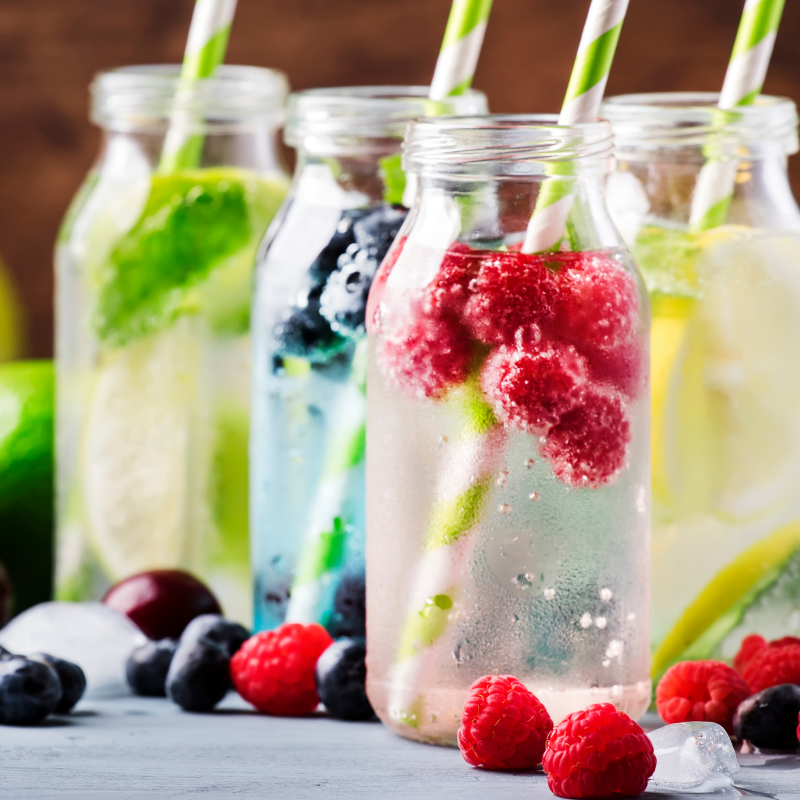When it comes to keeping your brain healthy and sharp, the foods that you eat matter. Research shows that foods rich in vitamins, minerals, antioxidants, flavanols, polyphenols and omega-3 fatty acids can help protect your brain. They can help to improve memory, concentration and overall brain health.
Here are 10 delicious brain food snacks (and two drinks) to feed the most important organ in your body
1. Smoked Salmon Deviled Eggs

Smoked salmon deviled eggs
Why it works: Whether it is for lunch, dinner, or a snack, these smoked salmon deviled eggs are a delicious option for when you need a quick brain boost. Salmon is packed with omega-3, a powerful fatty acid known for its brain-friendly properties. Studies show that a higher omega-3 intake can protect the brain against age-related cognitive decline, boost your mood, and support memory.
How to make it: Fill a large saucepan with water and add 8 large eggs. Bring to a vigorous boil and cover. Remove from heat and let sit for 10 minutes. Drain off the water and transfer eggs to a bowl filled with iced water; this will stop the cooking process and make the eggs easier to peel.
Cut the eggs in half lengthwise and use a teaspoon to carefully remove the yolks. Transfer the yolks to a clean bowl and mash well with a fork. Stir in ⅓ cup greek yogurt, 4 ounces smoked salmon chopped in bite-sized pieces, 1 teaspoon dijon mustard, dried garlic, salt, pepper, and a dash of Worcestershire sauce. Spoon a portion of the mixture into each egg-white half and sprinkle with paprika and chives.
2. Trail Mix
If you don’t have a nut allergy, adding them to your diet may provide you with some incredible health benefits. Although they’re high in calories, nuts are packed with healthy fats that are favorable for your noggin’ and could also protect you against certain chronic conditions, like type 2 diabetes and heart disease.

Trail Mix
How to make it: Mix together 1 ½ cups raw nuts (walnuts, almonds, peanuts, pecans, cashews), 1 cup raw seeds (pumpkin, sunflower), ⅔ cups unsweetened coconut flakes, ¾ cup unsweetened dried fruit (golden raisins, cranberries), ½ chopped dark chocolate.
Fun add-ins:
Air-popped popcorn
Pretzels
Spices:
Salt
Cinnamon
Nutmeg
Nutritional yeast
Turmeric
3. Yogurt-Covered Blueberries

Cover blueberries in yogurt
Among all the foods that are good for your brain, blueberries take the gold. Research suggests that consuming blueberries could help slow down brain aging by up to 2.5 years and support areas of your brain essential for memory and intelligence. The plain Greek yogurt in this recipe will help you feel fuller and more energized for longer, so it’s a great snack to keep in hand when that 4:00 pm energy crash hits.
How to make it: Wash and pat dry blueberries and line a baking sheet with wax paper. Using a toothpick, dip each blueberry into yogurt and twirl to make sure it’s completely covered. Remove the dipped blueberry with your (clean) fingers or a fork and place it on the prepared baking sheet. Repeat on all blueberries. Freeze until yogurt has set and feels dry to the touch, about 1-2 hours.
4. Turmeric Pumpkin Seeds

Pumpkin seeds
Pumpkin seeds are packed with potent antioxidants that protect your brain and body from free radical damage. They are also rich in zinc, an essential mineral that is critical for memory and thinking. The curcumin in turmeric has been shown to boost cognition and attention, and it’s been used for years as a complementary treatment for Alzheimer’s and other neurodegenerative conditions.
How to make it: Scrape out and remove seeds from pumpkin. Wash them in a colander under running water, making sure you remove all strands and pumpkin bits. Pat seeds dry and spread in a baking sheet lined with oven paper. Toss them with 1 tablespoon olive oil (can substitute for coconut or avocado oil), 1 teaspoon turmeric, ½ teaspoon paprika, salt, and pepper. Roast 10 minutes or until golden brown and fragrant.
5. Overnight Oats
Start the day right with an energizing combination of brain-healthy fats and proteins (Greek yogurt), complex carbohydrates (oatmeal), and essential vitamins and minerals (fruit toppings). As the name suggests, this no-cook breakfast works best when you let it steep in the refrigerator for at least 12 hours. If you are in a hurry, you can let sit for just a couple of hours or cook on a stovetop or microwave.

Overnight oats
How to make it: Mix 1 part rolled oats, ½ part plain Greek yogurt, ½ plant-based milk, and honey in a bowl.
Add in your favorite add-ins:
Nut butter
Cocoa powder
Pumpkin puree
Baked apple
Sugar-free jam/jelly
Pour mixture into mason jars and chill overnight in the fridge.
In the morning before you eat, mix in toppings for added flavor and texture:
Chia seeds
Chopped nuts (almonds, walnuts, cashews, peanuts)
Granola
Chia seeds
Fresh fruits
Banana slices
Chopped berries
Kiwi
6. Avocado Toast
Avocado is incredibly nutritious. It is loaded with heart and brain-healthy monounsaturated fats, and it is high in fiber, so it helps you feel full and energized for longer. Add an egg on top, and you are looking at a nutritional powerhouse that can help you get through any kind of morning.

Brain Food – Avocado Toast
How to make it: Slice one large avocado in half and scoop out into a bowl while you toast 2 slices of whole-grain bread. Smash it with a fork until you reach the desired consistency (feel free to play around with the consistency here; some people like their avocado toast completely mashed and others like it nice and lumpy — it’s up to you!). Add 1 teaspoon olive oil, the juice of half a lime, and salt and pepper to taste. Spread mashed avocado generously into each toast and enjoy.
Optional (and yummy) toppings:
Smoked salmon
Capers
Chives
Thinly sliced shallots
A poached, boiled egg, or fried egg
Sesame seeds
Radishes
7. Crispy Kale Chips

Kale chips
Evidence shows that lutein, a powerful nutrient found in kale (and avocados and eggs), could help reverse some of the signs of cognitive aging.
How to make it: Wash a large bunch of kale, remove middle stem, and rip into bite-sized pieces. Toss with 1 tablespoon olive or coconut oil, sprinkle with sea salt and pepper (to taste) and bake in a preheated oven at 325F for 20 minutes or cook in an air fryer.
8. Tuna Burgers

Tuna burgers
Tuna is also rich in brain-boosting omega-3 fatty acids and it’s a good source of protein, vitamin B12, and selenium. To pick the best canned tuna at the supermarket, opt for water-packed tuna over oil-packed and, whenever possible, choose brands that follow responsible fishing practices (look for FAD-free and MSC-certified seals in the cans).
How to make it: Toss 3 cans tuna, 1 small finely chopped red onion, ¼ cup chopped parsley, and 1 tablespoon dried garlic together in a bowl. Fold in 1 large egg, 1 tablespoon plain Greek yogurt, and (optional) hot sauce to taste. Add ½ cup panko breadcrumbs and use your hands to mix evenly. Shape into patties and cook until browned in a skillet lightly coated with olive oil, 3-4 minutes on each side. Serve warm.
9. 5 Minute Hummus
The protein in chickpeas makes hummus a perfect on-the-go snack that’s both filling and nutritious. Despite their size, chickpeas pack a powerful nutritional punch and are loaded with complex carbohydrates that fuel your brain and keep you focused and alert.

5 minute hummus
How to make it: To a food processor or blender, add: one 15 oz. can cooked chickpeas, ½ cup tahini, the juice and zest of 1 lemon, 2 garlic cloves, 2 tablespoons olive oil, 1 tablespoon ice water, paprika, salt, pepper, and cumin to taste. Blend 3-5 minutes or until creamy, stopping to scrape the sides as needed. Drizzle more olive oil and paprika before serving.
10. Chia Seed Pudding
Eating chia is perhaps the easiest and most effective way to get decent amounts of omega-3 fatty acids. They are also packed with proteins, antioxidants, and essential vitamins and minerals.

Chia seed pudding
How to make it: Whisk together ¼ cup chia seeds, 1 cup plant-based milk (almond, soy, oatmeal, rice, cashew), 2 teaspoons honey or maple syrup, 1 teaspoon vanilla extract, and a pinch of sea salt. Refrigerate for 2 hours or overnight and add favorite toppings.
11. Matcha Green Tea Lemonade

Matcha green tea lemonade
Studies show that people that drink tea may have healthier brains than non-tea drinkers. If you don’t have a matcha bamboo whisk to make this refreshing drink, try using a regular whisk or a fork. You can also use regular green tea instead of matcha powder by substituting the 2 cups of water with 2 cups of unsweetened green tea.
How to make it: Prepare matcha tea: using a bamboo matcha whisk, combine 2 tablespoons hot water and 2 tablespoons sifted matcha powder in a small bowl until a thick paste forms. Add 2 cups cold water, the juice of 1 large lemon, and 1 tablespoon honey to a large pitcher and stir until thoroughly combined. Stir in matcha. Pour over ice and garnish with fresh mint leaves (optional).
12. Golden Milk
Sometimes known as turmeric latte, golden milk is a traditional turmeric-based Indian beverage said to aid with digestion, promote sleep, boost mental clarity, and reduce inflammation. It is a healthy, nutritious addition to any diet and a delicious way to reap all the benefits of this mighty spice.

Golden milk
How to make it: In a small saucepan, combine: 1 ½ cups coconut milk or other non-dairy milk, 2 tablespoons honey, 1 teaspoon ground turmeric, ¼ teaspoon ground cinnamon (or 1 cinnamon stick), ¼ teaspoon ground cardamom. Simmer over medium-low heat for 10-15 minutes. Strain through a fine-mesh sieve and serve hot.
Optional: froth with a handheld frother for a creamier, foamy finish. Sprinkle with additional cinnamon to taste.
The bottom line:
The brain is a very important organ and the control center of our body. The foods we eat play a huge role in the structure and health of our brains. Including a variety of these nutritious foods in your daily diet will improve brain health, memory and alertness. These foods may also help to reduce the risk of age-related neurodegenerative diseases, such as dementia and Alzheimer’s.


